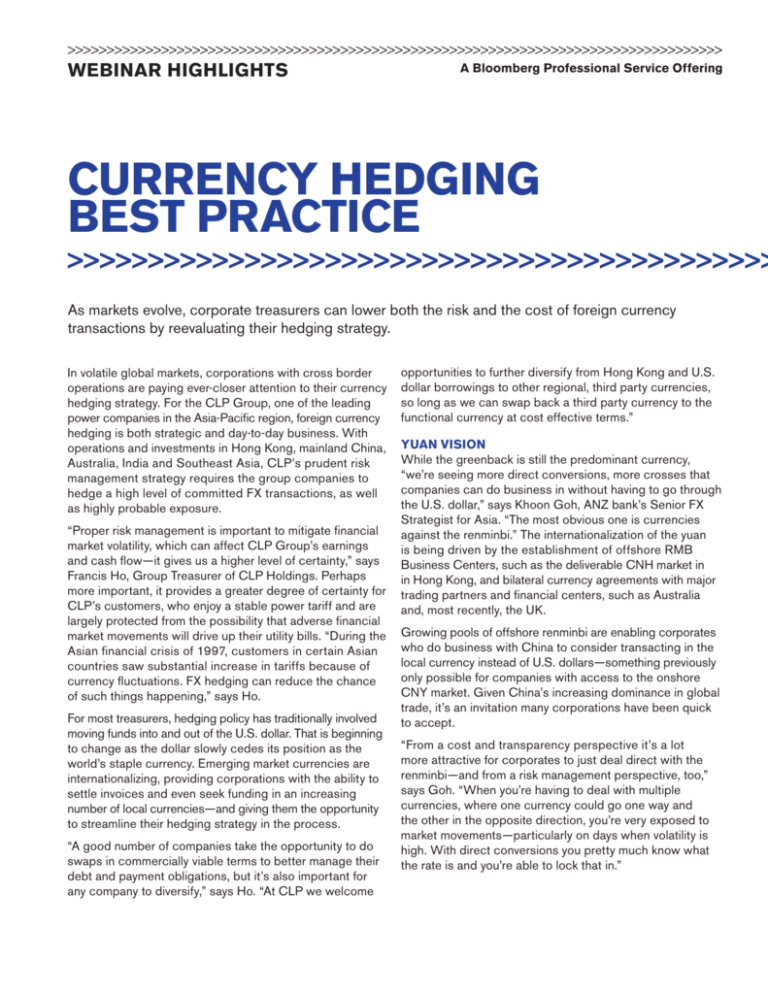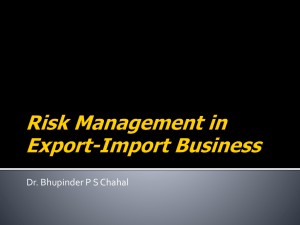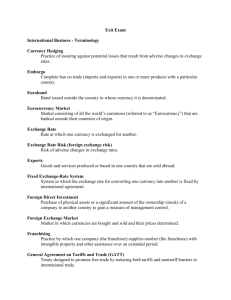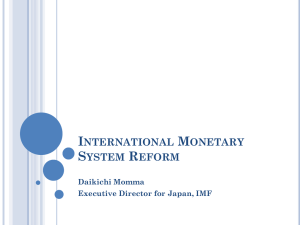
>>>>>>>>>>>>>>>>>>>>>>>>>>>>>>>>>>>>>>>>>>>>>>>>>>>>>>>>>>>>>>>>>>>>>>>>>>>>>>>>>>>>
WEBINAR HIGHLIGHTS
A Bloomberg Professional Service Offering
CURRENCY HEDGING
BEST PRACTICE
>>>>>>>>>>>>>>>>>>>>>>>>>>>>>>>>>>>>>>>>>>>>
As markets evolve, corporate treasurers can lower both the risk and the cost of foreign currency
transactions by reevaluating their hedging strategy.
In volatile global markets, corporations with cross border
operations are paying ever-closer attention to their currency
hedging strategy. For the CLP Group, one of the leading
power companies in the Asia-Pacific region, foreign currency
hedging is both strategic and day-to-day business. With
operations and investments in Hong Kong, mainland China,
Australia, India and Southeast Asia, CLP’s prudent risk
management strategy requires the group companies to
hedge a high level of committed FX transactions, as well
as highly probable exposure.
“Proper risk management is important to mitigate financial
market volatility, which can affect CLP Group’s earnings
and cash flow—it gives us a higher level of certainty,” says
Francis Ho, Group Treasurer of CLP Holdings. Perhaps
more important, it provides a greater degree of certainty for
CLP’s customers, who enjoy a stable power tariff and are
largely protected from the possibility that adverse financial
market movements will drive up their utility bills. “During the
Asian financial crisis of 1997, customers in certain Asian
countries saw substantial increase in tariffs because of
currency fluctuations. FX hedging can reduce the chance
of such things happening,” says Ho.
For most treasurers, hedging policy has traditionally involved
moving funds into and out of the U.S. dollar. That is beginning
to change as the dollar slowly cedes its position as the
world’s staple currency. Emerging market currencies are
internationalizing, providing corporations with the ability to
settle invoices and even seek funding in an increasing
number of local currencies—and giving them the opportunity
to streamline their hedging strategy in the process.
“A good number of companies take the opportunity to do
swaps in commercially viable terms to better manage their
debt and payment obligations, but it’s also important for
any company to diversify,” says Ho. “At CLP we welcome
opportunities to further diversify from Hong Kong and U.S.
dollar borrowings to other regional, third party currencies,
so long as we can swap back a third party currency to the
functional currency at cost effective terms.”
YUAN VISION
While the greenback is still the predominant currency,
“we’re seeing more direct conversions, more crosses that
companies can do business in without having to go through
the U.S. dollar,” says Khoon Goh, ANZ bank’s Senior FX
Strategist for Asia. “The most obvious one is currencies
against the renminbi.” The internationalization of the yuan
is being driven by the establishment of offshore RMB
Business Centers, such as the deliverable CNH market in
in Hong Kong, and bilateral currency agreements with major
trading partners and financial centers, such as Australia
and, most recently, the UK.
Growing pools of offshore renminbi are enabling corporates
who do business with China to consider transacting in the
local currency instead of U.S. dollars—something previously
only possible for companies with access to the onshore
CNY market. Given China’s increasing dominance in global
trade, it’s an invitation many corporations have been quick
to accept.
“From a cost and transparency perspective it’s a lot
more attractive for corporates to just deal direct with the
renminbi—and from a risk management perspective, too,”
says Goh. “When you’re having to deal with multiple
currencies, where one currency could go one way and
the other in the opposite direction, you’re very exposed to
market movements—particularly on days when volatility is
high. With direct conversions you pretty much know what
the rate is and you’re able to lock that in.”
“You can deliver into
Hong Kong now—
which means you
can effectively settle
in Hong Kong—and
that means suppliers
have less currency
risk on their side.”
— Simon Peisley,
Bloomberg Foreign
Exchange and Economics
Market Specialist
For Simon Peisley, Foreign Exchange and Economics Market Specialist with Bloomberg,
the yuan’s emergence is part of a broader, long-term trend among emerging market
currencies, with the Thai baht and Myanmar’s kyat among the other denominations
becoming more accessible to the region’s treasurers. “We’re seeing greater
internationalization of emerging currencies and businesses can take advantage of that if
they can get a handle on what’s happening and start to examine the alternatives,” he says.
SETTLING FOR LESS
Peisley points to Australia to illustrate how corporates conducting trade with China are
benefitting by removing the U.S. dollar from their hedging strategy. “You can deliver
into Hong Kong now—which means you can effectively settle in Hong Kong—and that
means suppliers have less currency risk on their side,” he says. “Purchasers can benefit
from this de-risking of the trade.”
Chinese manufacturers receiving U.S. dollars from their Australian customers routinely
add around five percent to their bills as a protection cost against adverse currency
movements. “Obviously that situation existed because there wasn’t a choice around
how you could receive funds. From a manufacturer’s point of view the only way to hedge
was to increase their invoice cost,” says Peisley. The importer not only got an inflated
invoice, they also had to add a forward cost for the U.S. dollar hedge before arriving at
their final Australian dollar price. “There’s a fair bit of slip. Effectively you’re crossing two
and a half spreads, and every time you cross a spread it costs you money.”
Settling directly in renminbi takes one spread out of the equation. The manufacturer
invoices in yuan, which the importer hedges into Aussie dollars. “There’s slightly over
five percent reduction in the overall cost of the transaction, just because we remove
the U.S. dollar leg of the currency hedge,” says Peisley. “Effectively both sides get a
2.5 percent discount, although the net result will probably be that the supplier gets a
smaller discount and the importer a greater one, depending on their relationship. So
it’s important to be on good terms with your supplier.”
With the U.S. dollar strengthening and the renminbi expected to weaken—dragging
Asian currencies lower in its wake—now is a good time for corporate treasurers that
have FX exposure to consider their hedging strategy. “While the U.S. dollar was continuing
to weaken, it didn’t make sense to hedge too much, but it’s going the other way now so
the need to act has increased,” says Goh. With high levels of volatility across all currencies,
settling direct in renminbi becomes increasingly attractive. “If you don’t you are exposing
yourself potentially to fluctuations in the renminbi against the U.S. dollar and in your own
local currency against the U.S.—which can be quite harsh in the current environment.”
HEDGING OVERSEAS
Funding markets are also evolving, giving corporates greater opportunity to take
advantage of lower interest rates in overseas markets and minimize the borrowing and
operational costs of their cross border operations. Again, hedging is a vital element of
the transaction, with cross currency swaps enabling treasurers to manage continuing
FX obligations, such as repaying both the principle and interest from a bond while also
financing operations in their functional currency. “If you’re a Hong Kong based company
you might be borrowing in U.S. dollars due to liquidity reasons, but you still need Hong
Kong dollars for everyday usage: if you want to buy something in Hong Kong, everything
has to be payable in Hong Kong dollars,” says Don Tang, Fixed Income Market Specialist
with Bloomberg.
CURRENCY HEDGING BEST PRACTICE // 02
“As businesses
internationalize
and start to get
exposure to more
currencies there is
definitely a need for
treasurers to expand
their knowledge on
what’s happening to
other currencies.”
— Khoon Goh,
ANZ bank’s Senior
FX Strategist for Asia
When entering into a cross currency swap, the corporation effectively becomes both a
borrower of foreign currency and a lender of local currency, helping to hedge the risk on an
ongoing basis. A more complicated hedge than the simple spot transaction required when
paying invoices, corporate treasurers can benefit from tools such as Bloomberg’s Swap
Manager, SWPM, which helps them to calculate the fair value interest rate for the second,
local currency leg of the cross currency swap. “The good thing is once you enter this type
of swap, going forward all the exchange for the U.S. dollar versus the Hong Kong dollar
will be marked as of the initial exchange rate,” says Tang. “You use the spot rate as your
future reference rate, so this is the perfect way for you to hedge. You don’t care about
what happens going forward.”
While the U.S. dollar again remains the staple currency for such funding arrangements, as a
resurgent greenback becomes more expensive to borrow in over coming years treasurers can
use tools such as Bloomberg’s XCF calculator to help identify cheaper sources of finance
in local currencies. For now the renminbi holds limited appeal as a funding source for most
businesses as it is only accessible from Chinese banks or by issuing in Hong Kong’s “Dim
Sum” bond market. However, as the currency becomes more convertible it may emerge as
an important source of international funding. While the Chinese government has not set any
dates, most observers expect basic yuan convertibility by 2015 and full convertibility by 2020.
BEST PRACTICE MAKES PERFECT
It’s that kind of regime change that corporate treasurers need to be across to avoid any
unintended risk. “As businesses internationalize and start to get exposure to more currencies
there is definitely a need for treasurers to expand their knowledge on what’s happening to
other currencies,” says Goh. “However, it’s not really practical for corporate treasurers to be
FX experts—they already have their day jobs—which is where partnering with the financial
institutions you deal with is valuable.”
By working closely with banks and counterparties, treasurers can gain access to information on
what’s driving the currencies they are transacting in, so they can make informed decisions on
when it is appropriate to hedge and also get advice on timing and execution. “FX markets
have been choppier than usual and even the currencies that have traditionally been stable
have seen very large swings,” says Goh. “So staying flexible and being able to act fast is
important. If you procrastinate you’ll find the market can move against you very quickly.”
In such volatile markets best practices are constantly in flux, which means treasurers should
challenge the status quo on a regular basis. “We’re all human and we’re just going to find
the easiest way to do things over time, but just because you’ve always dealt in U.S. dollars
to a counterparty it doesn’t mean that’s the most efficient method,” says Peisley. “Often a
change in regulatory regime, legislation or macro conditions can mean you need to reexamine
your currency hedging regime.”
Again the key is to work closely with banks and other counterparties that have expertise in
the market, absorbing their advice internally and assessing whether your current strategy is
truly best practice in the prevailing environment. “There’s no reason to change for the sake
of it, but there is a definite opportunity to make early adoption changes that will benefit your
profit and loss,” says Peisley. “Just because what you did yesterday worked, it doesn’t mean
it’s worthwhile for using tomorrow.”
CURRENCY HEDGING BEST PRACTICE // 03
>>>>>>>>>>>>>>>>>>>>>>>>>>>>>>>>>>>>>>>>>>>>>>>>>>>>>>>>>>>>>>>>>>>>>>>>>>>>>>>>>>>>>>>>>>>>>
BEIJING
+86 10 6649 7500
FRANKFURT
+49 69 9204 1210
LONDON
+44 20 7330 7500
NEW YORK
+1 212 318 2000
SÃO PAULO
+55 11 3048 4500
SYDNEY
+61 2 9777 8600
DUBAI
+971 4 364 1000
HONG KONG
+852 2977 6000
MUMBAI
+91 22 6120 3600
SAN FRANCISCO
+1 415 912 2960
SINGAPORE
+65 6212 1000
TOKYO
+81 3 3201 8900
bloomberg.com
©2013 Bloomberg L.P. All rights reserved. 54165391 0713








